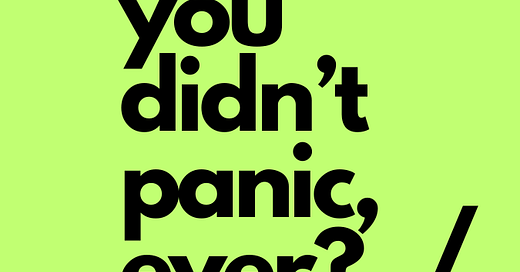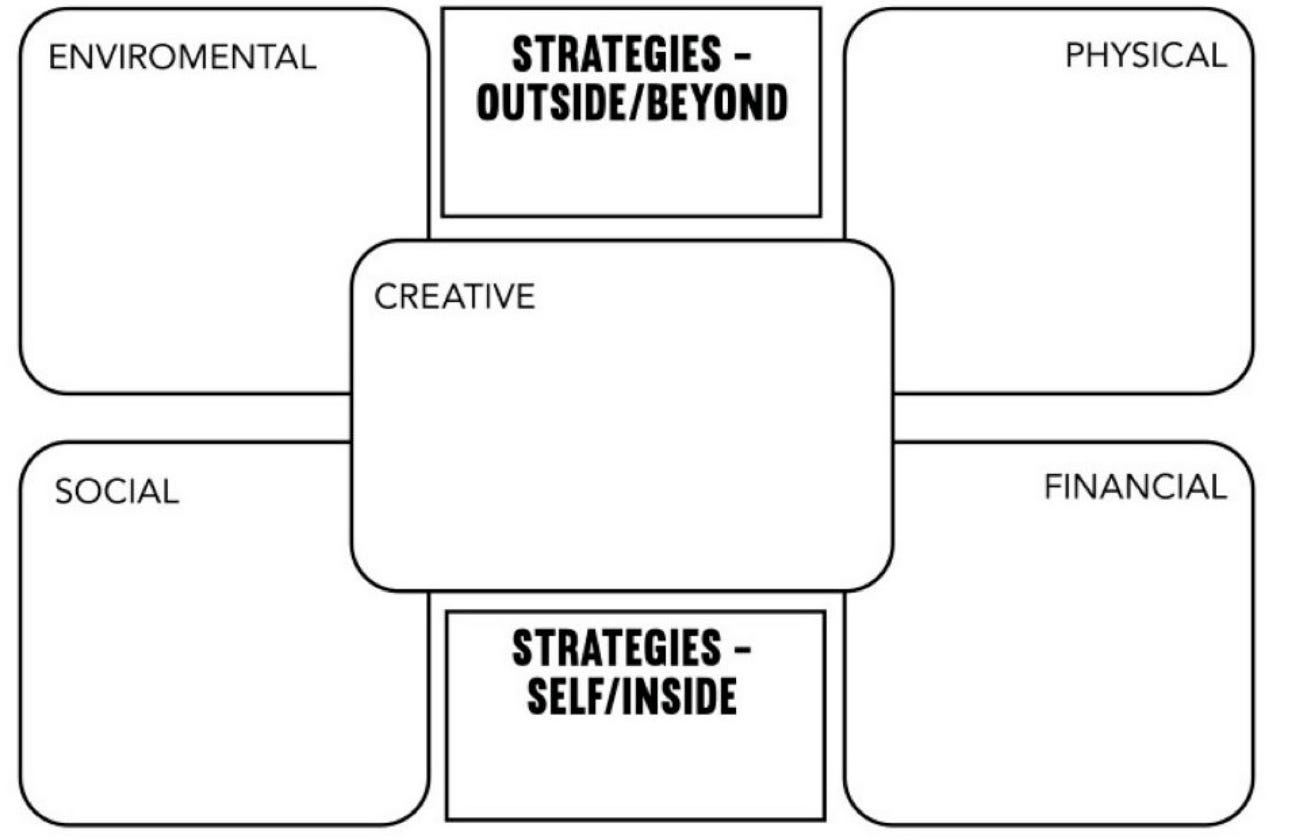To start: many thanks to all the new subscribers since I fired this up again last month. It really is a great motivator. Please do share and recommend it to your friends and foes, to the wise and the mistaken alike. And do subscribe if you’re currently a casual reader or a passer-by. It’s free! I’ll make it easy for you by putting a little button below.
Freelance lives
In May A New Direction published a provocation by freelance artist and facilitator Jessica McDermott, emerging from a peer learning programme in 2022-23. The title gives a clue to the solution underlying the North East Culture Partnership checklist I talked about in my last post: “Shaking up how cultural organisations work with freelance artists.” Jessica puts forward 10 ‘what if’ statements, including “what if artists could be paid for holiday, sickness pay, and pension contributions?” Beneath her questions lie many common frustrations.
Early experiences of freelance life
This got me reflecting on my own experience of freelance life. I worked as a freelance writer, editor and literature worker in my early 30s. It was a hard experience in many ways, involving stress, overwork until I got sick, and being continually broke. We had small children at the time. My wife worked at and from home, alongside training to be an ESOL tutor. I worked hard in the typical cycle of applications, projects, residencies and community/adult education. In that teaching I was often ‘one week ahead’ of the course, and that’s what life felt like a lot of the time. In my wife’s diaries from those years are little sums that reveal how the money in and out did or didn't add up that week. It was fine, with some juggling of credit cards, even exciting - until it wasn’t.
On the other hand, that cycle meant I was very productive. We didn’t call it that back then, but I was emerging. I published a lot of books in quick succession, started several poetry presses, ran poetry nights and zipped around doing poetry readings, residencies and other projects. I did all kinds of exciting things. I learnt all kinds of skills, many of which are now redundant. But I was more relieved than sorry to switch into a full-time job as Director of Cleveland Arts, where I had been the part-time Literature Worker. (I was able to draw on my previous career in catering for the management side of that role, if you were wondering. Stop me in person and I will tell you all about it, whether you want me to or not.)
I went freelance again in 2010, when I set up Thinking Practice after being made redundant in an Arts Council England restructure following on from Labour cuts in the wake of the Global Financial Crash. (It’s worth remembering it’s not only Tories that make cuts.)
Enablers for Thinking Practice
I have now been successfully freelancing as Thinking Practice for nearly 14 years – longer than any other single line on my cv. When I say successfully I primarily mean four things. I’ve earnt a living more or less appropriate to my experience and sector (though nothing like if I’d stayed at ACE). I’ve been useful to individuals, organisations and on a good day to the sector. I’ve kept learning new and interesting things, including keeping my creative writing alive if not always in bloom, working with hundreds of brilliant people. And I’ve never quite cracked up or sold out. (I had this framework before I found Ikigai.)
There are all sorts of things that have helped me pull off this trick for so long.
I was far too young for a pension (that oft-unmentioned enabler of the freelancer boom, pun intended) to kick in when made redundant. But I was old and wise enough to have lived in the same house and marriage for many years, in a cheapish part of the world, in a well-paid role at the point of redundancy, and thus able to pay the last few years of the mortgage off with my redundancy money. It’s hard to over-estimate how much of the worry of freelance life that eases, even though I am temperamentally suited to the inbuilt uncertainty of freelance life. Especially in the early years a blank-looking month down the road can be disabling to some people: it generally doesn’t phase me.
When I was an Exec Director at ACE, some people said we should have traded up the property market – something I had less than zero interest in and scorned. Some say it wasn’t the wisest thing financially, long-term, but for us it’s been invaluable. “Live cheaply, and you’ll remain free”, as the Amber Collective had it. So thinking about your financial position really carefully and knowing the risks you are taking helps successful freelancing. It'd be daft to ignore that, or to pretend it’s not helped me.
Charging, value and networks
This connects to charging. It took me a while to find the right(ish) spot, and I still vary charges for individual artists, but building the confidence to know and stick to what you need to make a living is key. (Sometimes people say I should charge more, very occasionally I’ll lose on price, but that’s ok.)
That requires track record, trust and understanding your position. It’s a truism, and in many ways a damaging phenomenon in the cultural sector, but networks matter hugely in any freelance practice, in any industry. I definitely benefited from the ‘bounce’ of leaving a relatively high profile job, as many freelancers do, although that wears off very quickly. (I remember one early interview in what still felt like my old office – I very much did not get that gig...)
Building and protecting your own personal credibility is also crucial to prospective freelancers, in whatever your network happens to be. That means being disciplined about not taking on work or clients that don’t fit with your values and purpose. See each job as a partnership with the people who pay you, whether it be a day or a long-term project. (Partnerships with other freelancers have also been really valuable to me, showing me new skills and approaches.)
Create things that either generate income without you tending them – eg products, things people can buy or subscribe to – or which lead to other work. For me this has been publishing consistently.I aim for a substantial paper or report every year, a book every now and again. This leads to speaking, training, workshops and new commissions. I give things away and make things free to access via Creative Commons where it is in my gift. Generosity is more a value/tendency than a business strategy, but it has served me well. (You can be generous and still a tricky stickler about invoicing and late payments, to state the obvious.)
My 10 What Ifs
I could, and do, go on. Obviously the universal laws of “don’t be a dick” and “get organizized” also apply. But I’ll cut to my own 10 ‘what ifs’ for freelancers.
1. What if you knew your own value and needs and charged accordingly, consistently?
2. What if you saw your work as a series of partnerships, not as a stream of gigs?
3. What if you saw all your working time as paid-for by the income of your business, including things like meetings and training for which you cannot always charge?
4. What if you took on at least one piece of work a year you were unsure you could actually do?
5. What if you saw your freelance work as acts of leadership: connecting, collaborating and multiplying?
6. What if you saw every rejection as a daft mistake by someone who should know better a learning opportunity?
7. What if you forgave yourself when you have taken on too much and need to set the alarm for 5am?
8. What if you behaved as if ‘work’ was but one part of a creative life?
9. What if you invested in your own development, so you could follow your own instincts even better?
10. What if you didn’t panic, ever?
Livelihood Assets
The Livelihood Assets framework is a tool from my book Tactics for the Tightrope (shockingly still available from Future Arts Centres in beautiful hard copy or as a free download). Originating from some work with Mission Models Money back in the day, it invites you to think about five kinds of assets: creative, environmental, social, financial and physical, and the strategies you might then design to suit your situation. I could have written some of the section above using these categories, hopefully the application is obvious. Do have a look, and a try.
One More Thing
A good question for any freelancer, any business, in any sector is “Who needs this?” I was reminded of this reading Young Vic Executive Director Lucy Davies’ elegant depiction of a week that had, as she put it, “zigged her zag”. Her post includes thoughts on funding cuts to National Theatre of Wales, the Sycamore Gap tree, and more. But she circles back to a question suggested by Turner Prize shorts-listed artist Rory Pilgrim’s recollection that “When I started art, my first question was: who needs this?”
Lucy concludes: “The apocalypse will eventually distribute evenly, make no mistake. Please may artists and leaders and Boards ask themselves, always and only: who needs this? Or else, the cliff edge. Play or be played.” This is a question I often come back. The answer is hardly ever everyone, but that doesn’t matter if the need is real.







